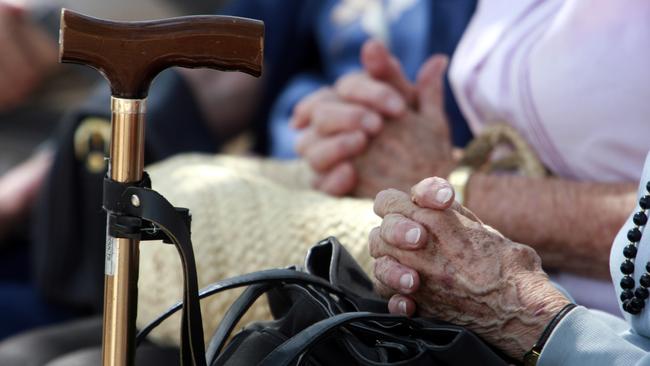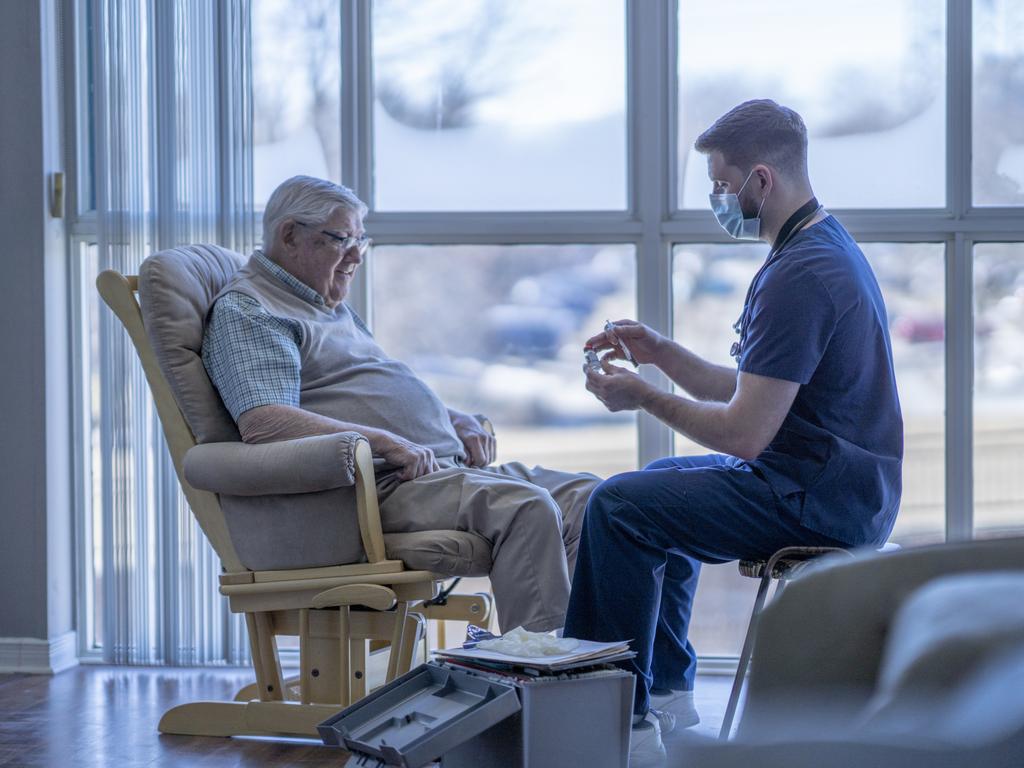Aged-care reforms placed on the budget backburner
Major aged care reforms proposed by an Albanese government taskforce to put the struggling sector on a firmer economic footing are set to be delayed beyond next week’s budget.

Major aged-care reforms proposed by an Albanese government taskforce to put the struggling sector on a firmer economic footing are set to be delayed beyond next week’s budget, sparking concerns from the sector over the pace of change.
Despite receiving the taskforce report in December, the government is yet to respond, and The Australian understands aged care won’t feature prominently in Tuesday’s budget.
It is understood the government is still working on finalising its position on a range of recommendations, and is also hoping to land bipartisanship with the Coalition on key measures, including more individual co-contributions to care and means-testing both in home care and residential aged care.
Aged Care Minister Anika Wells, who chaired the taskforce, is now charged with negotiating the response.
While most of the taskforce’s 23 recommendations require legislative change, several have specific budgetary implications, including more financial support for aged care in thin markets such as the regions and a boost to accommodation support for older Australians who are less well off.
Despite this, sources have told The Australian aged care won’t feature heavily in the budget as the response to the taskforce proposals “just hasn’t cooked yet.”
With more than half of residential aged-care providers operating at a loss according to latest financial data, the sector is growing alarmed at the slow response to recommendations that focus on requiring older Australians to make greater financial contributions to the non-care components of their aged care, including accommodation and food.

Chris Mamarelis, chief executive of aged-care provider Whiddon, said “another period of consultation and delay would be ludicrous”.
“The taskforce has conceded the industry is underfunded and won’t meet future demands of an ageing population,” he said. “Anything less than full adoption of those recommendations means we have been playing charades for a year.”
Aged and Community Care Providers Association chief executive Tom Symondson said hopes for broad aged-care reform in the 2024 budget were waning.
“We do not think we will see many budget announcements directly related to the new aged-care act or the government’s response to the aged-care taskforce final report,” he said.
“We think there may be some signposting in the budget, but it would be difficult to put precise figures to these reforms until they are finalised.
“Reform for the funding crisis is linked to the broader reform associated with the new aged-care act and can only be solved by long-term structural changes, enshrined in legislation.”
Opposition health and aged-care spokeswoman Anne Ruston said the Coalition had offered bipartisanship on the issue since last year. “The Leader of the Opposition made clear in his last budget-in-reply speech that the opposition would support sensible measures put forward by the government to ensure our aged-care system is sustainable into the future,” Senator Ruston said.
The government is understood to be looking to dovetail its response to the taskforce into its broader legislative reform program focused on the new aged-care act. Timing of finalisation of that act has been deferred beyond the aged-care royal commission’s proposed July 1 this year, with the government not giving up hope it can still be done in 2024.
But the taskforce report, released in March, recognised the need for more government support through the budget, as well as greater private contributions, to ensure financial sustainability for the sector.
The radical reform blueprint would see richer older Australians in nursing homes paying more for their rooms, their meals and their everyday living costs.
Similarly, those getting in-home care packages would contribute more for services such as cleaning and gardening.
The report said the government should look after the direct personal care costs of an older and increasingly frail population, but individuals with means shouldn’t be able to hoard their money to pass on as inheritance.
“To ensure the aged-care sector can meet increasing demand and community expectations, further investment from government and participants is needed in the home and residential care sectors,” it said.
Lincoln Hopper, chief executive of St Vincent’s Care, which operates 26 aged-care facilities across three states, said there was “strong support from the sector for the government to accept the taskforce recommendations in full … We’d expect the budget is the time and place for government to signal its intention … to the recommendations.
“And we’d also expect that the opposition would be willing to come on board with a bipartisan approach to those recommendations,” Mr Hopper said.
Ms Wells’s spokesman said the government was “carefully considering our response to the Aged Care Taskforce. We will continue to engage parliamentarians on the opportunity and responsibility we all share to provide better aged care into the future. This work will build upon the strong aged-care reforms we have already delivered, including addressing 69 royal commission recommendations.”
While the budget may not deal with taskforce recommendations, there are likely to be more homecare packages announced, as the government moves to meet surging demand for people to be supported in their own homes. There may also be detail on how the government plans to pay wage increases awarded by the Fair Work Commission to aged-care workers in non-direct care roles.
With so much in flux, Uniting NSW chief executive Tracey Burton said it was better to get the reforms proposed by the taskforce right than to rush them through.
“It’s essential we get this right for senior Australians. The budget is a key next step, but the work won’t stop there,” she said.
“We need bipartisan support and a collaborative approach to make sure we can deliver an aged care system our older Australians both want and deserve.”







To join the conversation, please log in. Don't have an account? Register
Join the conversation, you are commenting as Logout